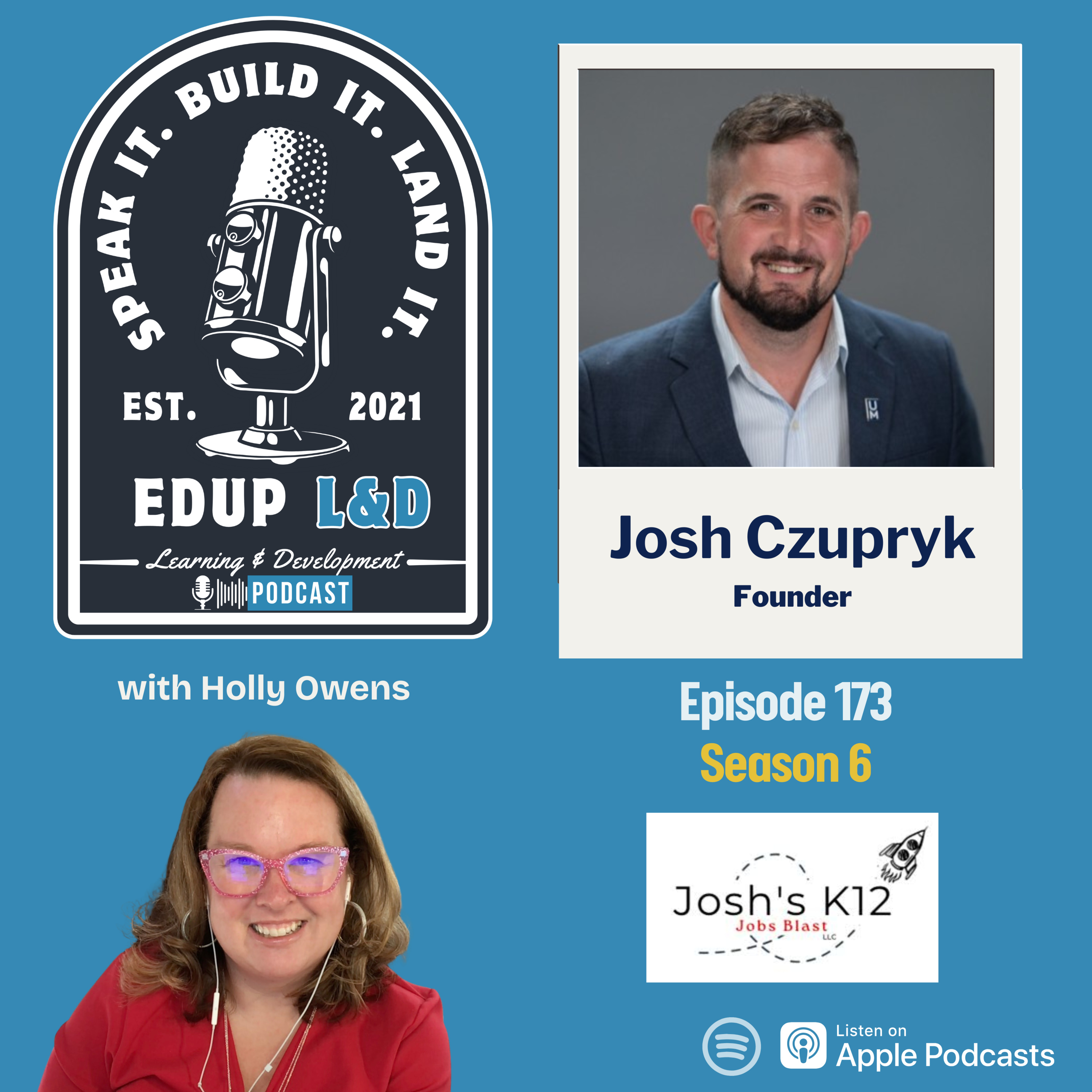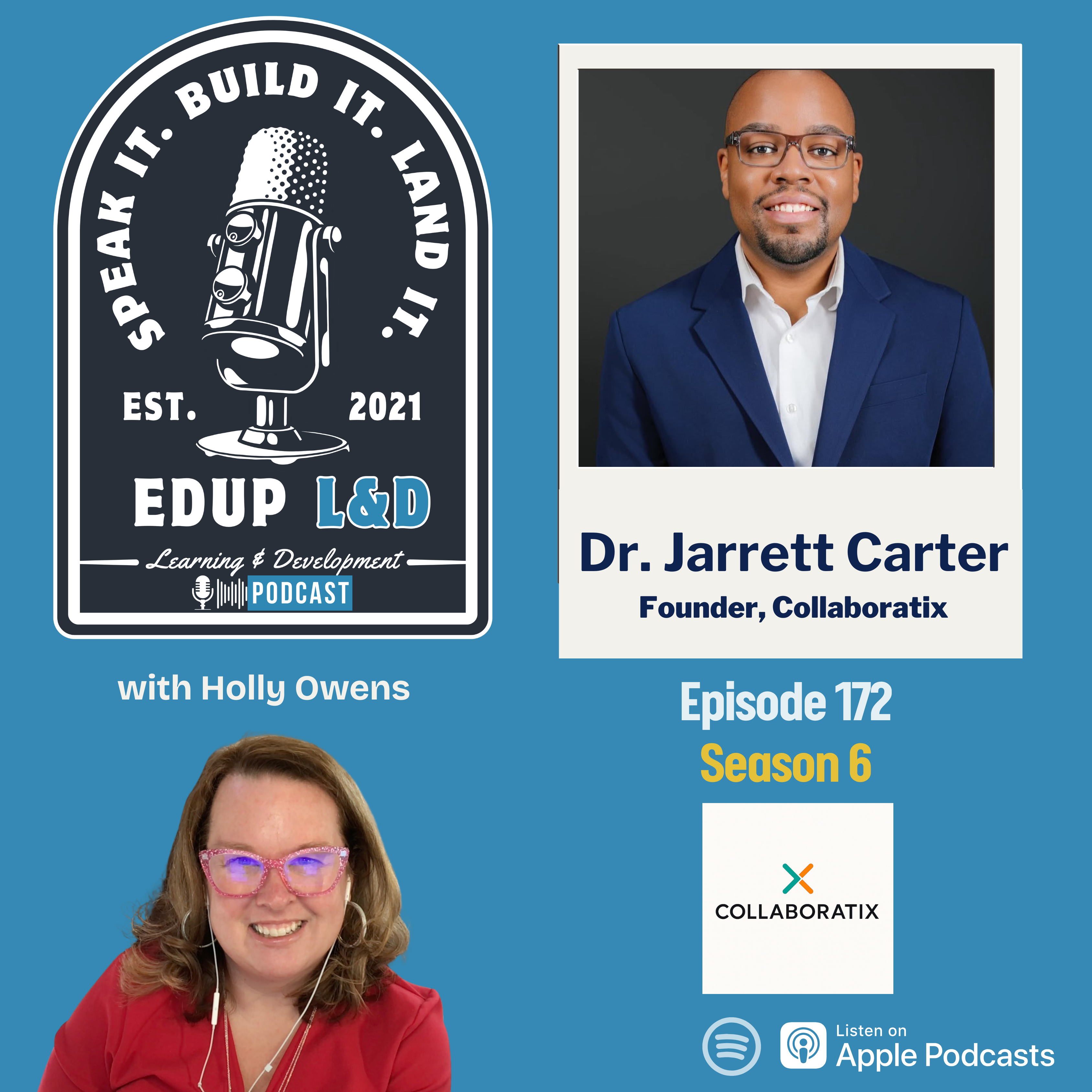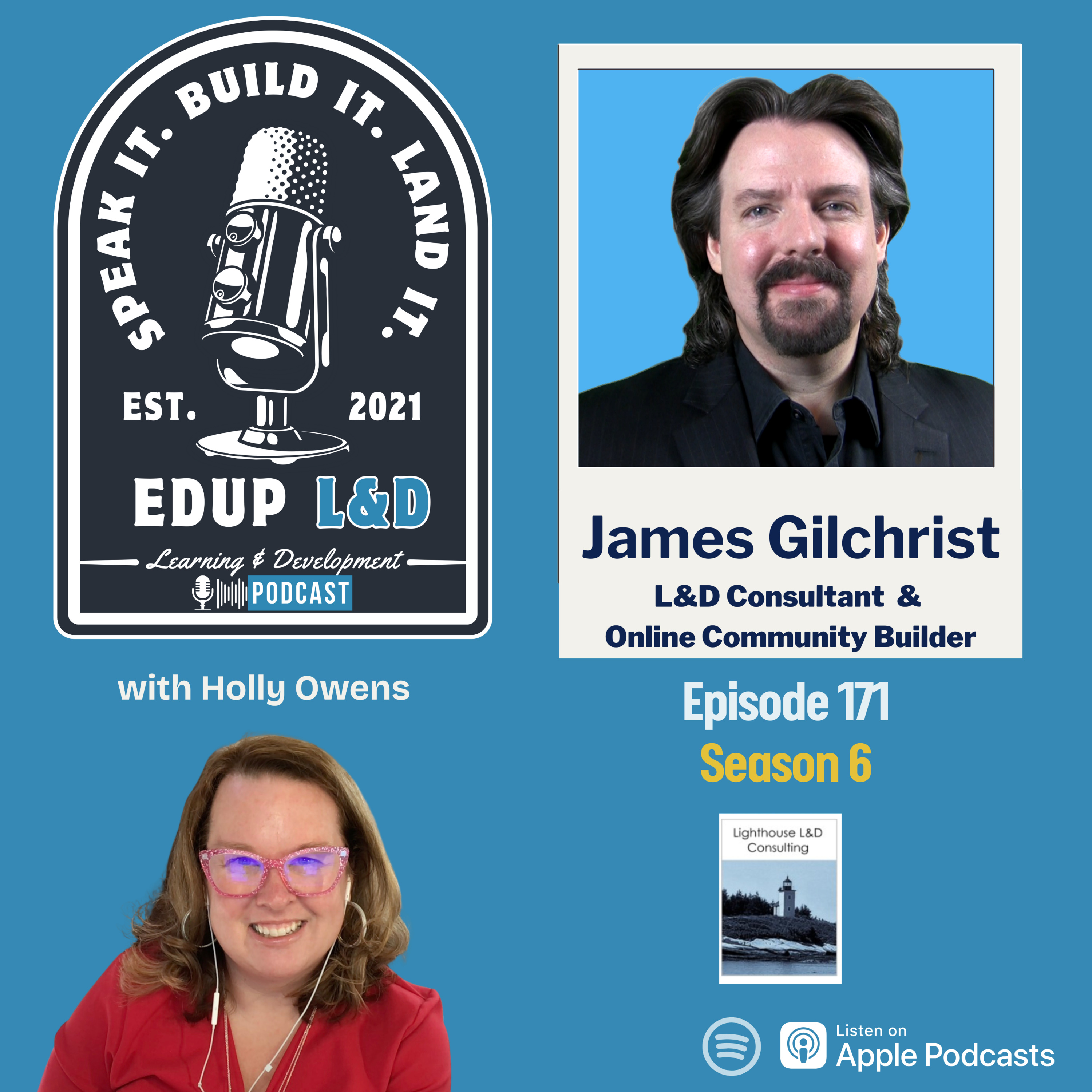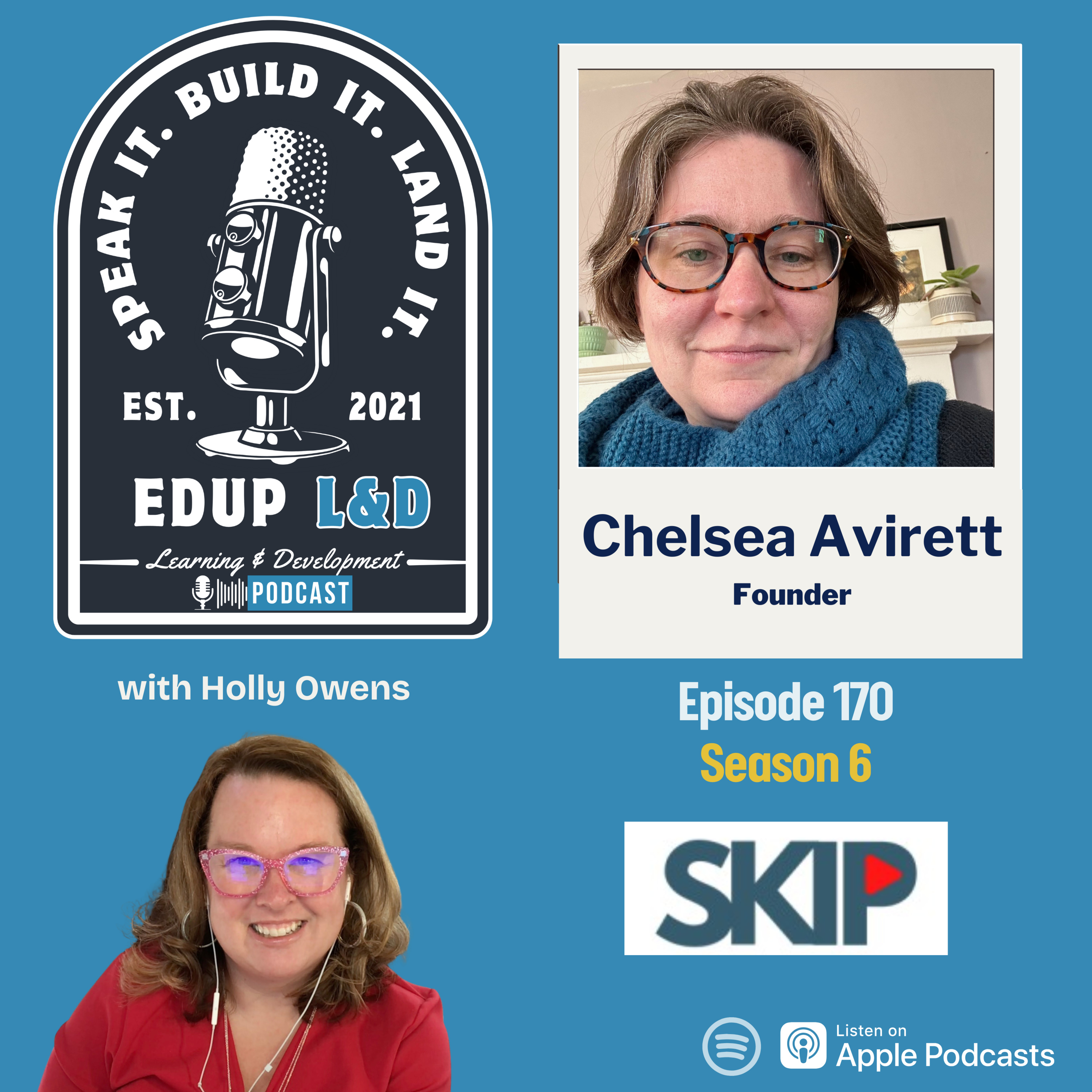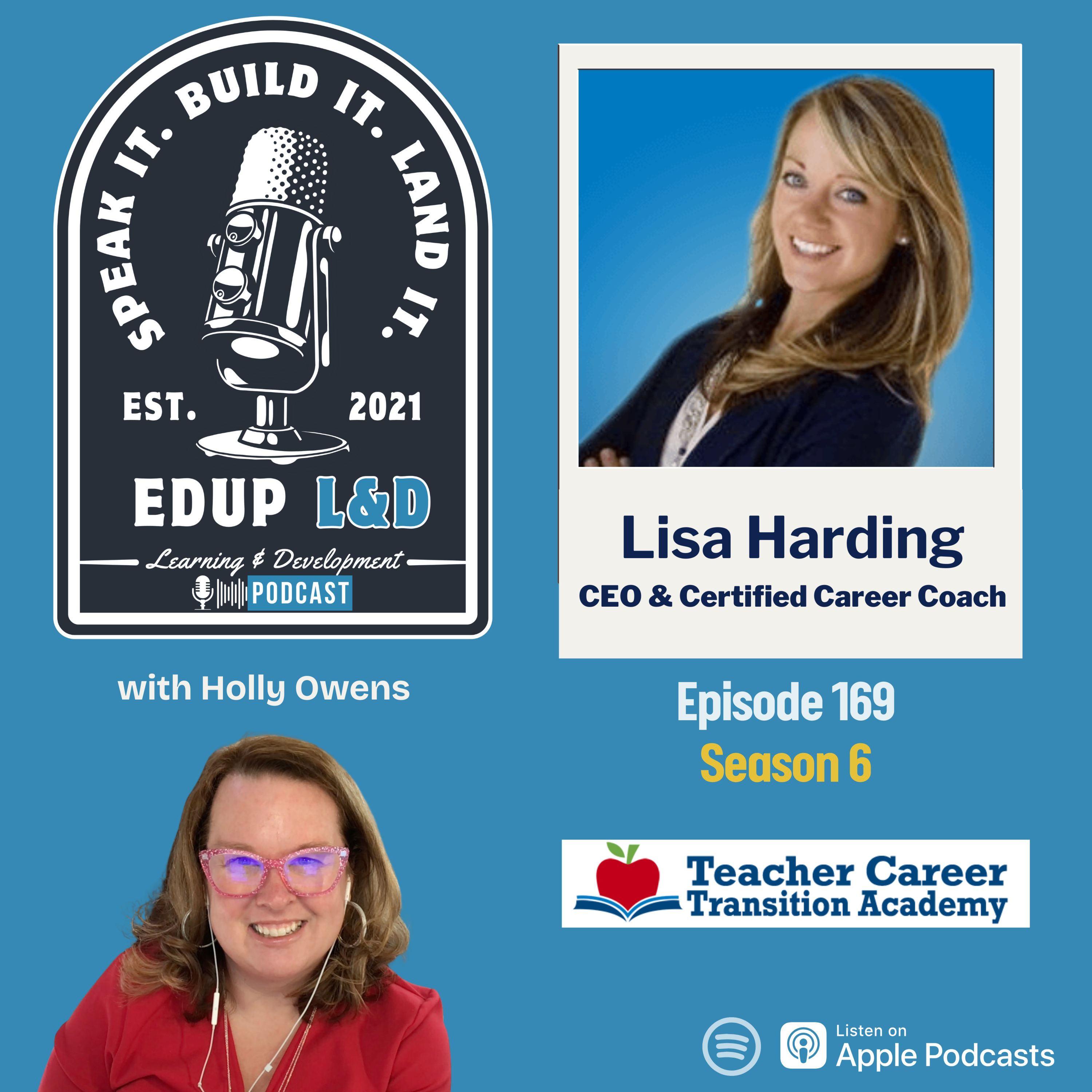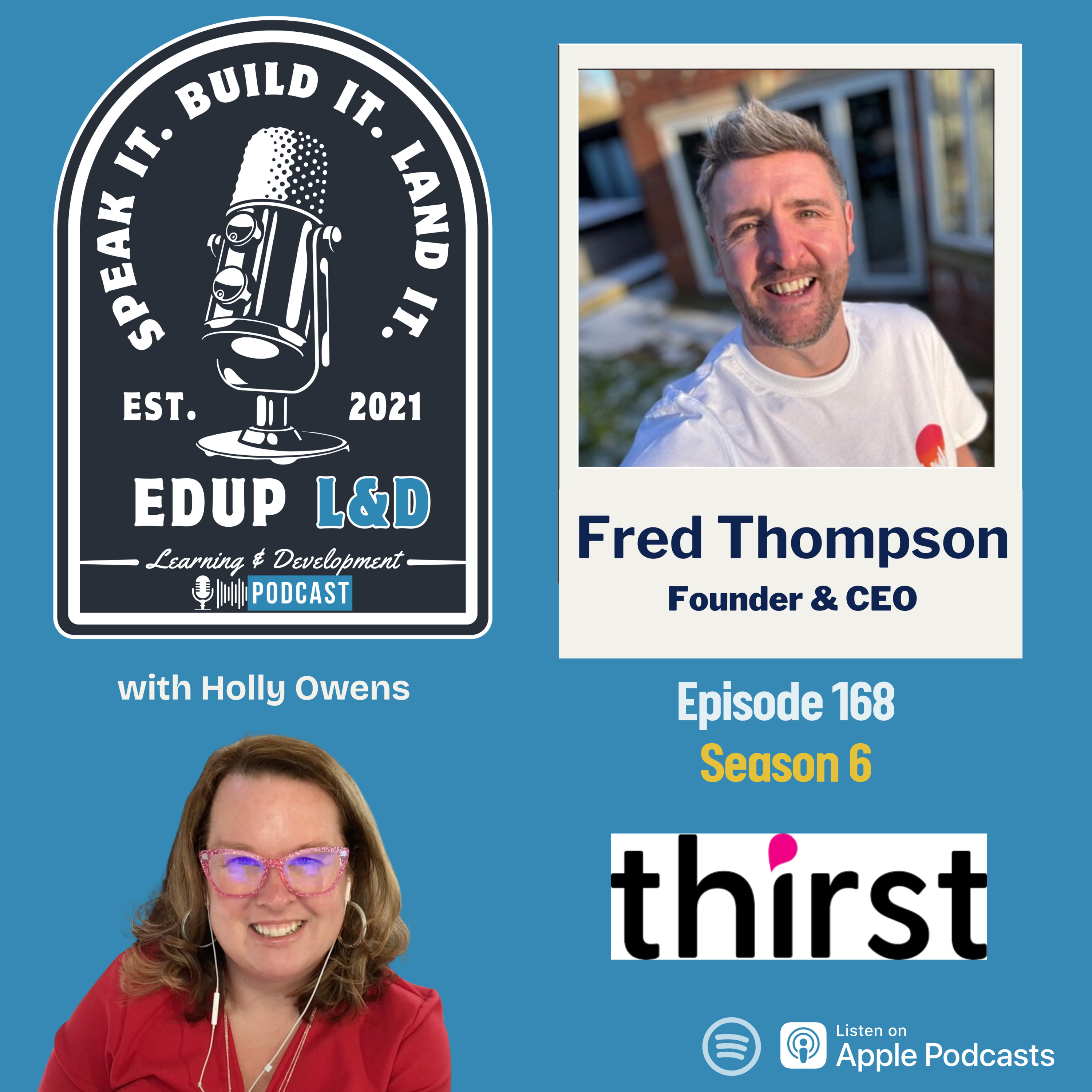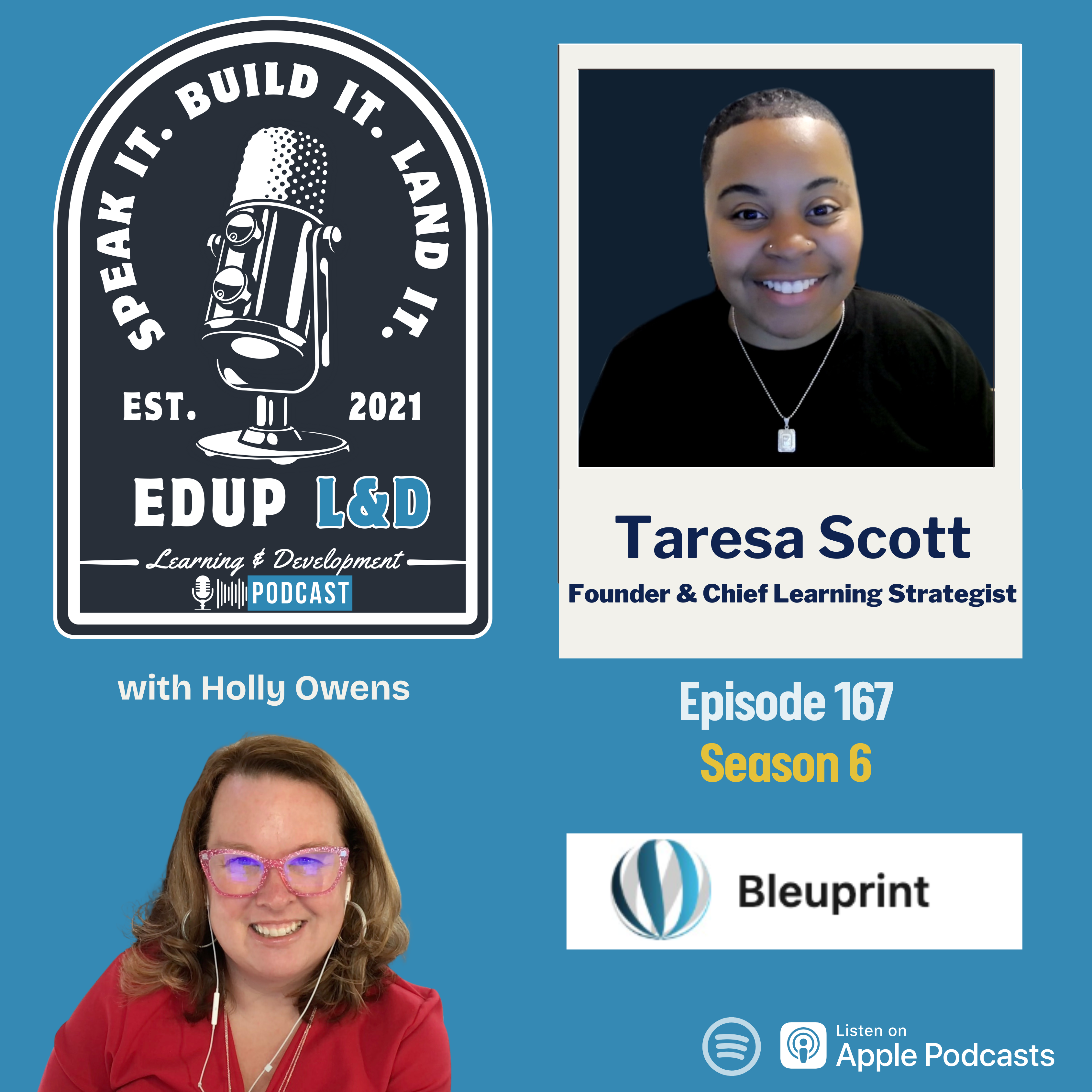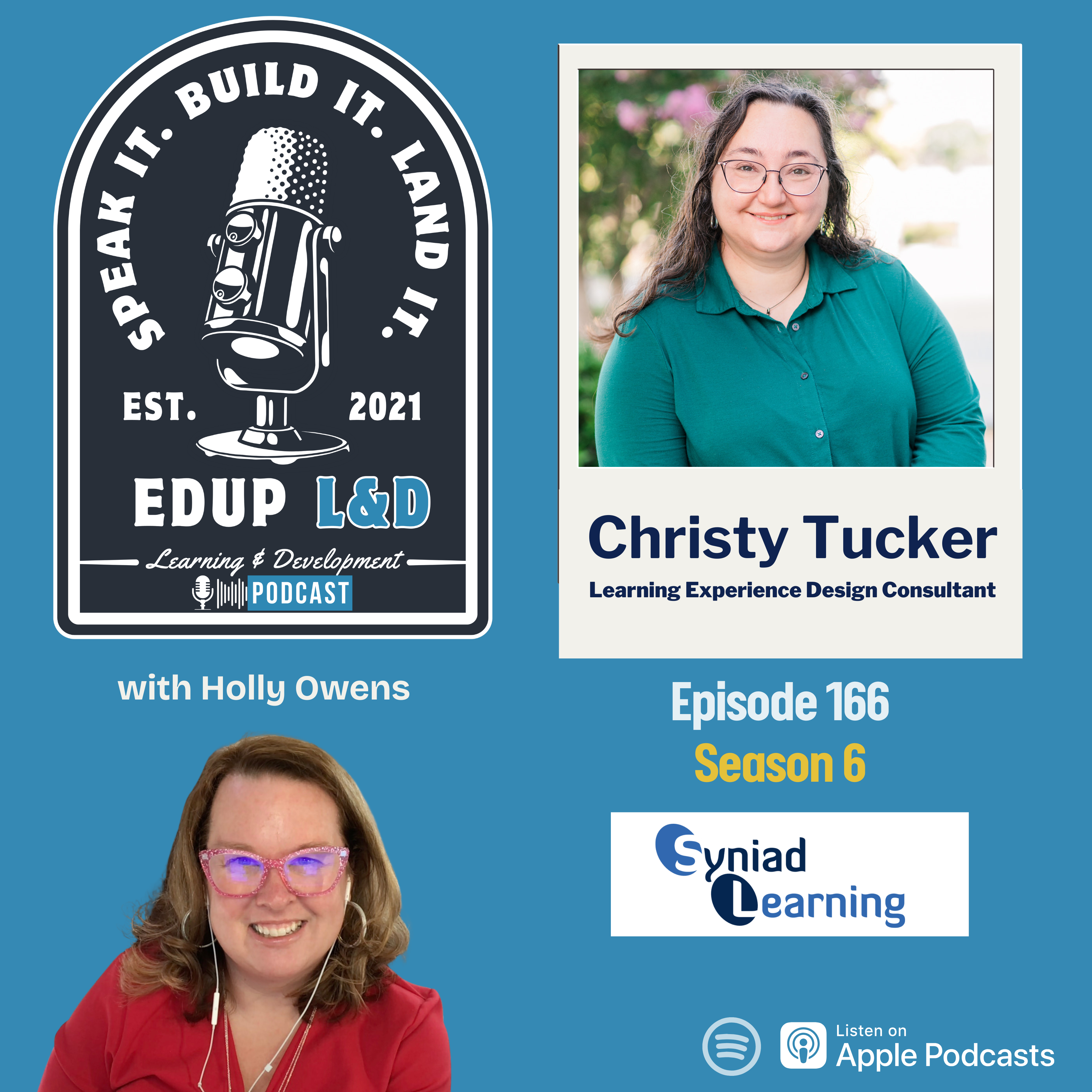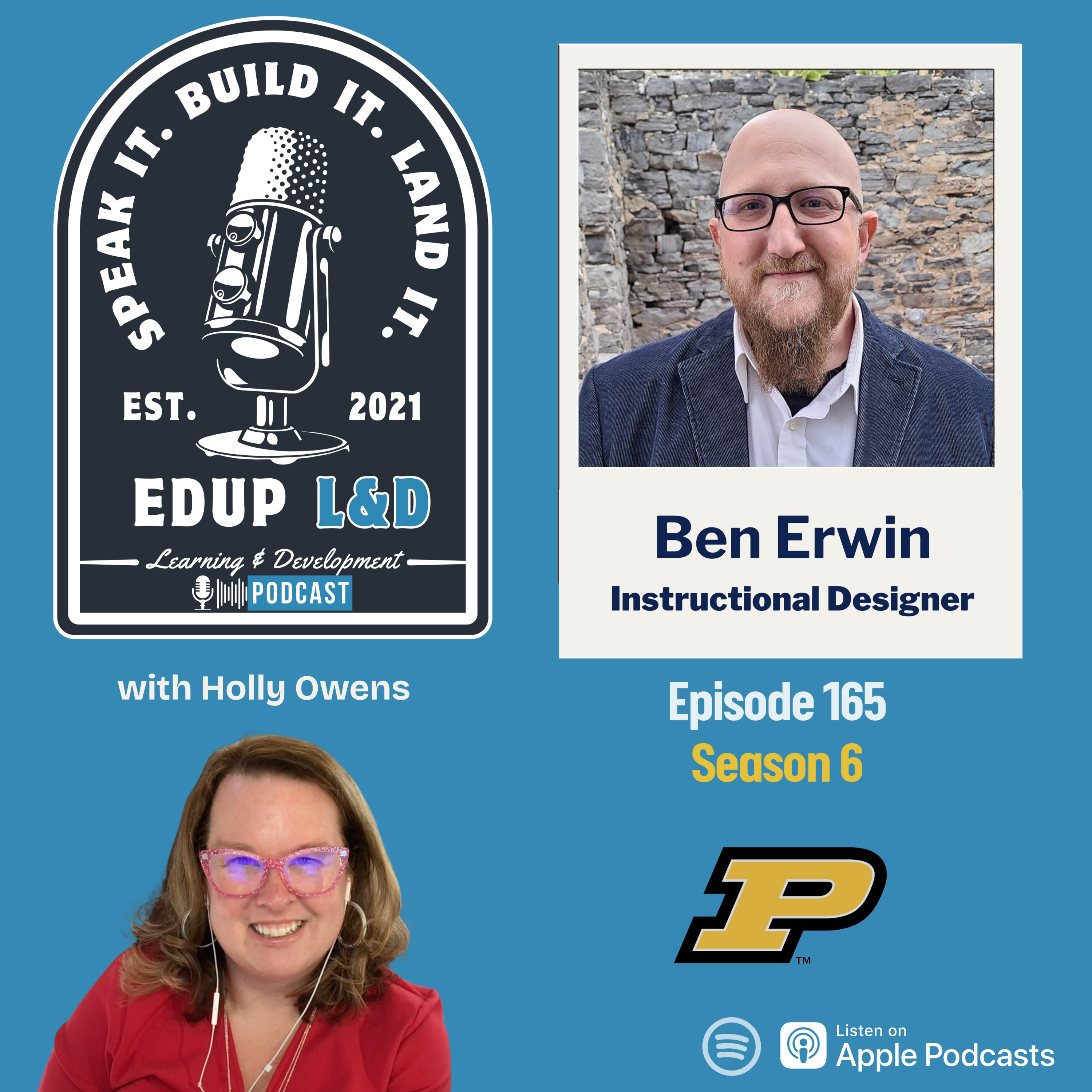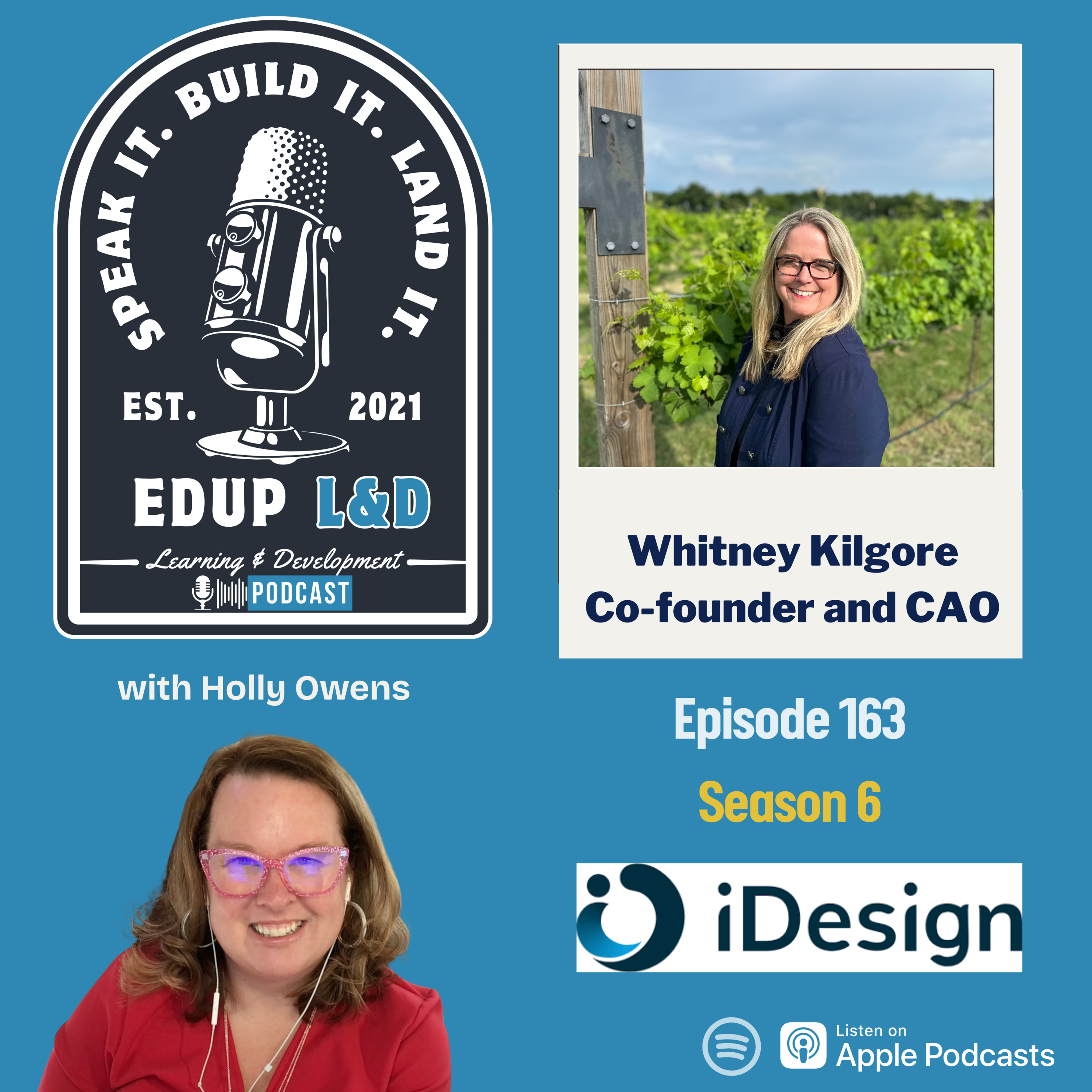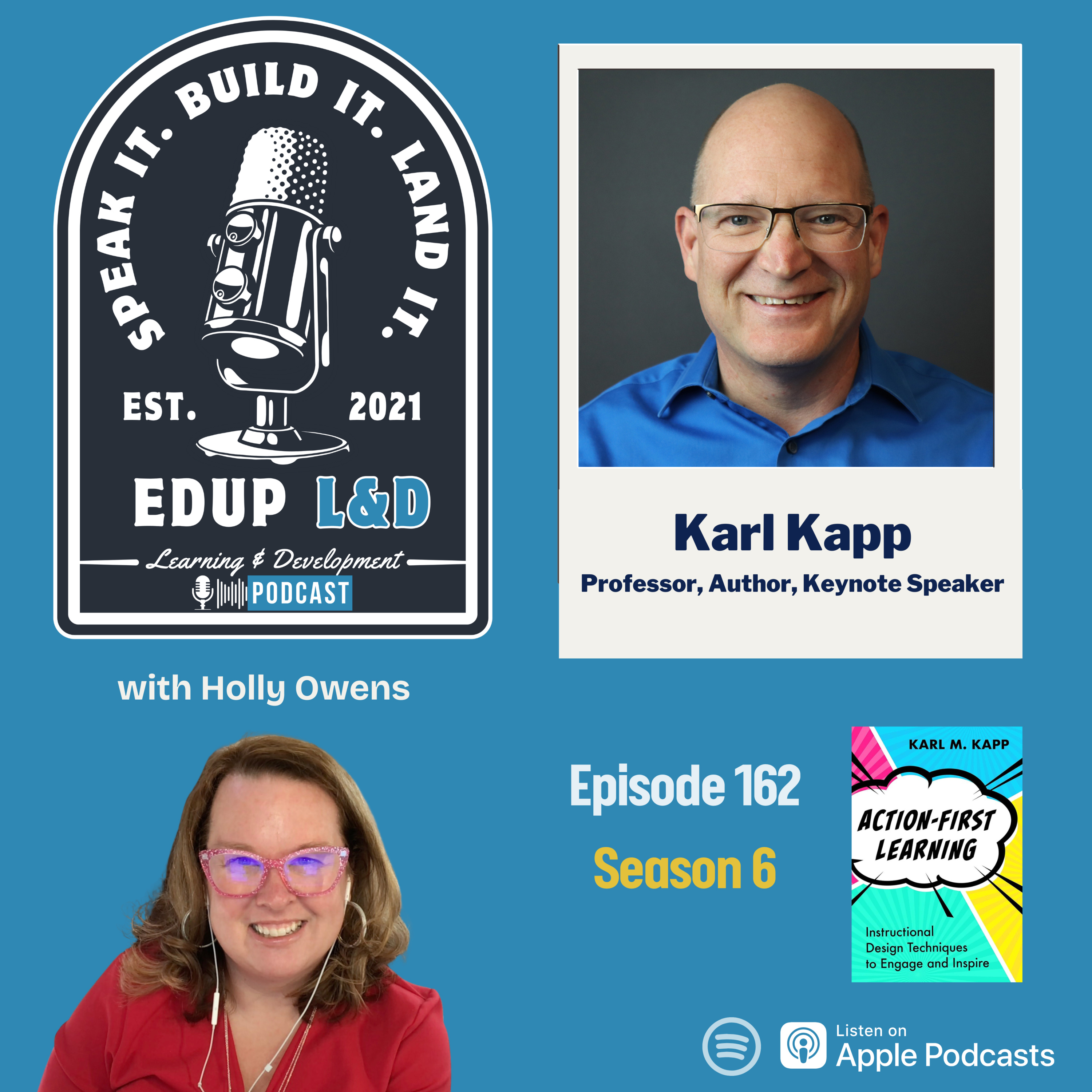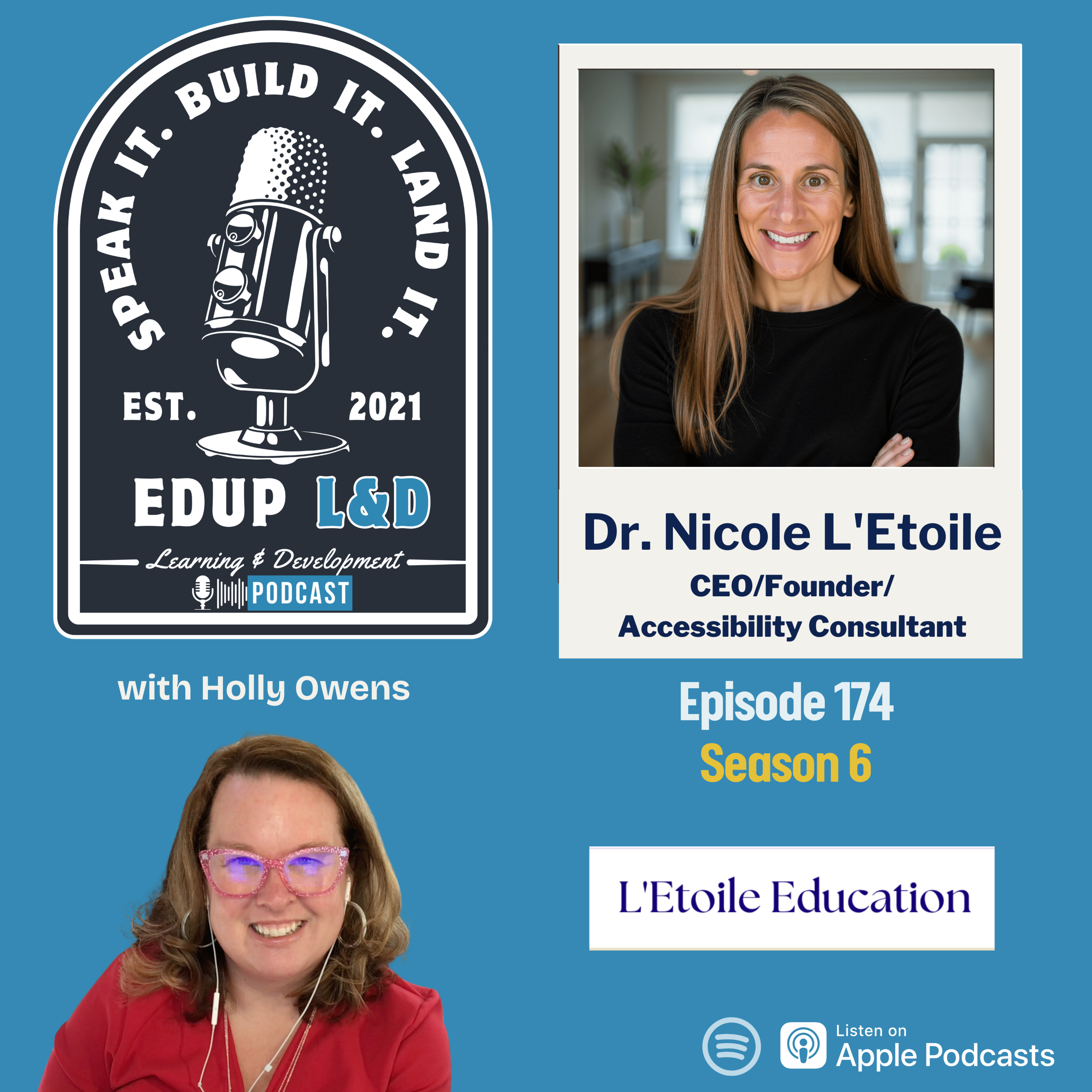
In this episode, Holly Owens and Nicole L'Etoile discuss the critical importance of accessibility in education and corporate environments. They explore the need for proactive approaches to accessibility, the challenges faced by organizations, and the upcoming federal regulations that will impact compliance. Nicole shares insights from her accessibility cohorts and community initiatives, emphasizing the importance of networking and continuous learning for educators transitioning into accessibility roles. The conversation highlights the resources available for those looking to enhance their knowledge and skills in accessibility, as well as the significance of maintaining one's teaching experience in the professional journey.
In this episode, Holly Owens and Nicole L'Etoile discuss the critical importance of accessibility in education and corporate environments. They explore the need for proactive approaches to accessibility, the challenges faced by organizations, and the upcoming federal regulations that will impact compliance. Nicole shares insights from her accessibility cohorts and community initiatives, emphasizing the importance of networking and continuous learning for educators transitioning into accessibility roles. The conversation highlights the resources available for those looking to enhance their knowledge and skills in accessibility, as well as the significance of maintaining one's teaching experience in the professional journey.
Resources mentioned in this episode:
- L’Etoile Education
- WCAG (Web Content Accessibility Guidelines)
- Contrast Checker
- NVDA Screen Reader
- CPACC Certification
- Section 508 / ADA Title II Standards
Guest Contact Information:
___________________________________
Episode Sponsor: iSpring Solutions
🎙️ Huge thanks to our friends at iSpring Solutions for sponsoring this episode of the EdUp L&D podcast! 🙌
If you haven’t already, be sure to check out the iSpring Learning Exchange Community — a vibrant space for creators, educators, and L&D pros to connect and grow.
Grateful for the support and excited to see what our community creates 💡
Thanks for tuning in! 🎧
Holly Owens (00:01.496)
Hello everyone and welcome to another fantastic, fabulous, I'm gonna stay proactive because we're talking about accessibility today, episode of EdUp L &D. I am happy, grateful, pumped. We're pumped to welcome back my friend Nicole, who is going to tell us all about accessibility. But first, Nicole, tell people who you are, what you do. You've been on a previous episode. They need to go back and listen to it. But tell us all about you for those in the audience who.
have not met you yet.
Dr. Nicole L'Etoile (00:32.179)
All right, hey everyone, hi, I'm Nicole L'Etoile It is great to be back here with you, Holly. I'm just so excited. We have so much to catch up on. It's been just over a year and a lot has happened. I'll say that it's been busy in a good way. I can't complain. With my company, L'Etoile Education, just growing the course, making online content accessible for all. We're now heading into, in the third cohort.
Holly Owens (00:41.719)
Yeah.
Dr. Nicole L'Etoile (00:59.263)
Kind of the fourth, we had a side one happen. We can talk about that a little bit. Trillium, that just popped up. And so we're coming into the fourth cohort this October and just really excited. And with that, I've had a few clients along the way doing audits for learning management systems and courses, getting ready for the new ADA Title II ruling, getting courses for clients for that. Yeah, pay attention. It's a big deal.
Holly Owens (01:02.902)
Yeah.
Holly Owens (01:20.012)
Yeah. If you don't know people, something federal is coming out that's going to impact you.
Dr. Nicole L'Etoile (01:28.191)
So anyway, yeah, so it's been good supporting some clients around different spaces, know, coming out of education this past year, the last six months, and working with organizations at local and state agencies and governments too. So a little bit of everything. Yeah.
Holly Owens (01:42.978)
Yeah, I've been watching you. I've been in all the stuff that you've been doing. And I'm like, like, where first of all, where does she find all the time to do that? And second of all, I'm like, this is such an important topic around accessibility because people are still Nicole. And I know this bothers you just just as much as it bothers me are taking accessibility and they are not putting it as more of a proactive approach in their organizations or institutions. They're more reactive to it.
I feel like what's coming down the line with the federal regulations will hopefully get people to have a proactive approach. But before we dive into all the stuff you've been doing, can you tell us a little bit about why it's important for accessibility to be something that's proactive in a company rather than something that's reactive?
Dr. Nicole L'Etoile (02:32.286)
Well, it's less painful. We'll just start there, right? It'll be a whole lot, it doesn't seem to be that, be a whole lot easier. It's a lot less painful in terms of, yes, learning's hard. We have to learn how to build accessibility, but it's harder when we have to go back and retrofit and rethink and rework because we know where...
Holly Owens (02:35.552)
Yeah.
Holly Owens (02:55.362)
So much time.
Dr. Nicole L'Etoile (02:56.817)
It's time, it's also like you put your effort, you know, you put your heart and soul into something you design, you create it. It's your baby. You've you've put all this energy and to have it feel lies if like there's something wrong with it when there's not, it's nothing that is wrong with it. We're just out, you know, looking for ways to improve it so that all can use your beautiful, amazing content. But it's harder when it's already done and designed to then look back, especially folks who've been in this for a while where they have catalogs.
Holly Owens (03:00.803)
Yeah.
Holly Owens (03:17.197)
Yes.
Dr. Nicole L'Etoile (03:25.351)
of courses and it's overwhelming to think, you know, where do I start? Do I go back and fix all this? Most people get overwhelmed with it because they want it to be good. That's because they do care. So when they retrofit and they come back after they think, I gotta go back and fix everything now. So yeah, so I think that's why it gets harder.
Holly Owens (03:41.846)
Yes, once you see it, you can't unsee it. I promise.
Holly Owens (03:49.986)
Yeah, I definitely agree with you too. just, you know, I just want to start off with that question right off the bat, because I feel like it's, it just bothers me that it's still not a thing to people. It's still just like this, this checklist item that we'll worry about later. And I really feel like people shouldn't, shouldn't be an afterthought. Like you said, it makes things easier. It really helps everyone. It's just not with people with disabilities. It's people who, you know, like,
color contrast, my gosh, that's the one that bugs me the most. But I'm being honest, when I see things out on LinkedIn or I see, you know, I am judging you. If you're using like yellow backgrounds and you're using like low contrast, the colors, it just, that kind of stuff is just so easy to fix. Yeah.
Dr. Nicole L'Etoile (04:31.293)
Yeah.
Dr. Nicole L'Etoile (04:36.029)
Yeah, it's easy to like kind of look and go and think I don't have time to learn it. So I, you know, we've got new designers, we will get it. know we're going to get into this, but I have a designer right now who's fantastic putting in all this work into the course that we're teaching around making accessible, but they're also trying to learn the tool at the same time while learning to be a designer. And I give them kudos for saying, I'm going to learn it from the start.
Holly Owens (04:45.995)
Yeah.
Dr. Nicole L'Etoile (05:00.351)
But you can see the learning curve there. And they're just said to me, it was almost like I just wanted to reach across the zoom and be like, no, come, I'll help you. Maybe I should just build it. And then I can go back and worry. I was like, no, no, we're not doing that. not doing that. So I can see if you're not, know, if you don't have the guidance, which we can get into, like I've had this big grand idea for a mentoring program next year, whatever. Like, I just feel like we need to do something because we can't keep doing what we're doing anyway.
Holly Owens (05:07.628)
Hahaha.
Holly Owens (05:13.88)
We're not doing that.
Holly Owens (05:28.686)
Well, tell us about all you've been doing because you've had a lot of great initiatives that's happened in the past year, including your accessibility cohorts, working with Luke Hopson in the instructional design institute. So tell us what you've been up to. What have you been doing this past 365 days?
Dr. Nicole L'Etoile (05:42.527)
Yeah, so I, you asked me like, how did you, know, where are you getting all this time? I remember sitting here a year ago too, talking to Dr. Luke Hopson going, how do you do all this? Where do you have all this? And now I'm going, oh, I kind of get it now because you're excited to drive and yeah, so yeah, so the course launched as part of Instructional Design Institute as part of IDI and it was kind of a branch off of that. And we had our first cohort in January of this year, 2020.
Holly Owens (05:52.81)
Right? Yeah. I understand.
Dr. Nicole L'Etoile (06:12.383)
five, almost a January, 2026, 2025. And we've had a mix of folks coming in from higher ed. We've had some K-12, more of the virtual online space K-12, but higher ed K-12, but also corporate, nonprofit, folks who are consultants themselves who want to increase their knowledge so they can offer this as a service to their clients.
We've had folks who are overseeing as a director of curriculum that are working on new launches of ed tech programs that are trying to up, know, up skill and accessibility. So we've just had so many different folks and new designers is what I'm really excited to see. Me too. Yeah, me too. Yeah, it's great to have everyone.
Holly Owens (06:54.766)
I love hearing that by the way. It's great.
Holly Owens (07:01.07)
Yeah. So like, what are you seeing? Like, what are some of the things that you're seeing with these cohorts or people coming in? Where, where are they kind of lacking in the, the knowledge of accessibility or what are some of the things like they're just, I want to know about blank here. Cause it's probably a question that a lot of our audience members have too, when they, they don't follow you on LinkedIn, they need to follow you. Could you give accessibility tips as well? Um, but where do you kind of see where it's common across that everybody's asking about this or that?
Dr. Nicole L'Etoile (07:29.791)
Yeah, and as we know, everything varies. and as the cohort has gone on, we started out with, I think I had 10 people the first one, 13 the second one, we got up to 15 this one, it's growing. And the levels as it goes on, I've gotten more advanced and newer. So we are seeing an increased level of folks who have been doing this on their own, right? Self-teaching.
Holly Owens (07:33.614)
and
Dr. Nicole L'Etoile (07:57.715)
working through it, and folks that are just new to it. So what I see is someone who hasn't explored the web accessibility guidelines at all. As soon as I start using WCAG and putting out the numbers, and we start saying, WCAG 2.21, sometimes it's like that, is I don't want to know that just yet. We get a glimpse of there's a lot to learn here. And then I have someone in my cohort who's a WCAG specialist that's in their title.
who's just like, give me your process, how are you auditing? And I need to do this for my job. And I'd like to learn from you at the same time. So yeah, we're really divided in our.
Holly Owens (08:34.541)
Yeah.
Holly Owens (08:39.15)
Skill levels are like, and knowledge levels are really across the board.
Dr. Nicole L'Etoile (08:42.267)
We have a big gap right now and it's like closing that in trying to get people to and meeting them where they are. And I do love that this is facilitated. I don't think I could ever teach it or just create the self-paced and send people on their way because you to meet them where they are. I we pivot. We're using UDL, Universal Design for Learning in practice in this moment and being responsive. And I meet typically by week two. I can get a sense of where you are.
So then I can start to target and kind of create a pathway that supports you while others are being supported in their pathway and hopefully they can work together. And that's the beauty of a cohort, right? So it's just kind of like trying to figure out. So we've just got different levels all over the place. We've got people.
Holly Owens (09:24.706)
Yeah, I can see that. And I think it's interesting too that you're getting people who have that actually in their title and that's their role. And like you say too, like we don't know everything. Like we know a lot in terms of like you're an accessibility expert. I know a lot about L &D jobs. I don't know everything. So it's important to remain open to learn from those people as well. See what they're doing, ask them questions because while we remain an expert, we still have things learned.
One of things I want you to mention is when's next cohort coming? Because we're going to include everything in the show notes for that.
Dr. Nicole L'Etoile (09:56.959)
Yeah, October 1st. And this one is an 8.30 early AM Eastern time. We've been... don't know if that helps anyone in the... Because the EAA, the European Accessibility Act, is also driving some of the folks to the course and driving some of the work, which has been helpful for us here in the States as well. And if you're out there listening, we're meeting 8.30 to accommodate the European schedule, nice and early, Wednesday morning.
Holly Owens (10:05.297)
Oooooh!
Holly Owens (10:23.928)
To me, at 30, I'm about 90 minutes into my work day, because I'm an early bird.
Dr. Nicole L'Etoile (10:27.955)
Yeah, yeah, for some people, yeah, I was like, so I don't know how that works for your West coaster. If you want to get up at 530 and joins, we'd love to grab your coffee, grab your tea, whatever it may be. You can always go back to sleep. I don't know. Or maybe just start your day. Yeah, you become a 5am or
Holly Owens (10:38.862)
Yeah, sounds good. So I have everything in the show notes on how to sign up for that. What else are you doing? What else other exciting initiatives are happening?
Dr. Nicole L'Etoile (10:49.343)
yeah, I feel again, there's a lot in terms of, well, since we, you know, we started this accessibility L and D Slack and I say we, because like, and there's 812 people in there as of this morning and we just launched it in And so, you know, one of the, was one of those things I was in a live session. I was in a webinar and, I got to give shout out to Louis and the TLDC group.
Holly Owens (11:00.404)
that's right. forgot about the Slack channel too. I need to get in there.
Dr. Nicole L'Etoile (11:16.415)
over there because it was one of those sessions. I don't remember exactly what conference it was. And I was watching someone or listening to someone present. Again, not being an expert, I still go to everything to see what other people do, to see if I've missed anything, make some connections. And I was in someone's presentation, a little newer to accessibility. And I was listening and I was like, we need a place for all of us to go regularly. Yes, I know these groups exist, but we haven't talked all about accessibility.
Holly Owens (11:19.138)
He's awesome.
Dr. Nicole L'Etoile (11:45.839)
24-7, we need that. So I sent a message to two other people on LinkedIn. was like, I'm gonna do this. Do you want in? And they were like, yeah, when do you think? And I'm like, I don't know, a couple of days, maybe I'll post it. Not even, this is how Nicole works, within five minutes, post it, because I had the thought. And I was like, here it's now, it's fresh, get it out there. And it...
Holly Owens (11:46.805)
Right.
Holly Owens (12:05.558)
Yeah, but we're the same. Yeah.
Dr. Nicole L'Etoile (12:42.739)
Yeah, we could talk about that too. So that's a new initiative that branched off of that. we had three sessions in June, three or four in July, and we've got four more coming up. I think by the time this comes out, though, it'll have completed. But it was called the Summer of Access Webinar Series. we had everyone doing things from audio descriptions to how to blind learners use the screen reader, navigating a course with NVDA.
Holly Owens (12:45.966)
Please.
Holly Owens (13:10.36)
Mm-hmm.
Dr. Nicole L'Etoile (13:13.335)
I don't know, we did keyboard navigation, all free, know, anywhere from 45 to an hour sessions. And those are just people in the Slack group that said, I'll do something, I'll do something. So I've just kind of put it all together and got it out there.
Holly Owens (13:27.946)
Yeah, it's like your own little, it's your own little workshop series happening. And the Slack channel generated that. So networking is important, everyone. Networking is very, very important. Will those recordings, will we be able to share those? Or did you, yeah, okay. Okay, so the Slack.
Dr. Nicole L'Etoile (13:36.851)
Yes, networking is very important.
Dr. Nicole L'Etoile (13:42.129)
Yeah, they're in the thought group. we did as a, you know, you put group, have access to the there, because they're, they're on listed on YouTube. And so if you get into the thought group, yeah, you get in there. It's free to join. It's free to join.
Holly Owens (13:50.464)
Understood. Yeah, so we'll get everybody into that Slack groups. Right, every, the thing I love about this most is, and although you're the cohort and things like that is that most of it's free. It's like people don't understand that the resources that you need in order to become a quote unquote expert in accessibility are free. It's not like you need to pay for something. If you want more of like what you're doing with the cohort, you want more of that, like we're going through this at a certain pace and we're.
breaking it out and scaffolding into certain topics and that is something that takes a little bit longer to kind of organize. So obviously that's paper, most of stuff is like free that's out there.
Dr. Nicole L'Etoile (14:28.959)
Yeah, there's a lot of free right now and you can get in there and be part of it. then, yeah, and so the paid option, I'm coaching, I'm giving feedback, you we're taking your project and we're fixing it along the way. It's just, it's a support, you know, an additional support. So the Slack group is completely free and so is the series. And then people share so many other free resources and support in the group as well. every, you know, the L &D community is so giving.
Holly Owens (14:46.797)
Yeah.
Dr. Nicole L'Etoile (14:58.781)
I mean yourself, right? You give up so much. You have all these offerings. You do this podcast. You give up all your time to work with new instruction designers and support everyone. So where do you find the time?
Holly Owens (15:00.279)
Yeah.
Holly Owens (15:11.896)
Yeah.
Holly Owens (15:15.298)
Yeah, have to, you know, actually I learned from Luke how to kind of manage everything. When he was doing some of those virtual working sessions, like we were recording himself, like with music and stuff and kind of doing Pomodoro technique, I kind of took that as I needed to change my, how I'm focusing myself every time that I'm working. So I've consistently been using Pomodoro and doing tasks and I keep one task per 25 minutes. That's it.
Dr. Nicole L'Etoile (15:42.569)
That's amazing.
Holly Owens (15:43.904)
If I finish early, then I can start on the other task, but otherwise it's 25 minutes. I give myself at the beginning of the day, I do a brain dump, which is something that's recommended by Mel Robbins. And then I spend the first 25 minutes of the day going through emails and organizing myself. And then it's off to like my top task. I just start checking them off the list. What the...
Dr. Nicole L'Etoile (16:04.957)
Is it rewarding? just like you said, then you get to do another task. Like, do you feel good when you complete the first one and then you're like, do the next one?
Holly Owens (16:10.062)
Yes, I'm the type of person that I was like, I have a checklist. And when I talked about this with Ben Irwin too, because he's a checklist person, I crossed off the list as just some sort of motivation there and some sort of serotonin or something that's really kind of like when you go shopping for something. The dopamine of completing something is really something that motivates me. And I think if it's something
Dr. Nicole L'Etoile (16:30.291)
Yeah.
Holly Owens (16:36.908)
that I'm passionate about, especially the idealist that I share with all the different books and job boards. It's double dope in me because at the same time, I love doing this stuff. It's like a game to me. I don't know what it is. And then I also love the fact that I'm supporting other people and their journeys and helping. Like that's the second piece of it is like, if you have a child or you have, know, from having students in K-12, you don't want them to make the same mistakes you did in life.
You want them to have the nice laid out path so that they can move to something faster than you did or avoid this or avoid that. So that is the motivation behind everything that I do.
Dr. Nicole L'Etoile (17:18.835)
Yeah, that's neat. I mean, there's something about getting to the certain level, right? So there's the gaming of like, I got this thing, I'm checking it off and getting to the next level. But the reward is that we were helping others advance, which is...
Holly Owens (17:30.486)
Yeah, and getting those messages and LinkedIn, I'm sure you get them too. When people just take time out of their day, I'm not gonna talk about the other messages I get, because those are the ones that make me mad. But the people that take time out their day to just simply say like, thank you, Nicole, thank you, Holly, for all that you do for the community. That just reinvigorates me to do even more and want to give back more, because that's telling me we can't see how impactful our work is from this side.
I mean, we know, we're aware of it, but I can't see what it's really doing in the community. Like, I don't know every time my name is brought up or somebody shared the resource I can track with analytics, but I don't know every time that that's happening. I hope it's happening. But when somebody says that, that's just recognition, that reassurance that that is in fact happening.
Dr. Nicole L'Etoile (18:14.591)
Great.
Dr. Nicole L'Etoile (18:21.149)
Yeah, and it no matter, it doesn't matter how many times it happens, but even someone just posting and saying, thank you for sharing this resource, I saved it or any acknowledgement to something that you put out there. It kind of gives you a little boost of, well, keep putting it out there. Maybe someone doesn't say thank you for it that day, but someone saw it, probably saved it, maybe they used it. And so that's what keeps you going, you the consistency. So you kind of just keep showing up.
Holly Owens (18:40.674)
Yeah.
Dr. Nicole L'Etoile (18:46.335)
And it's just being passionate. think you said that too. If you're really passionate about your work and you want to do it, even no matter if there's a like or kudos at the end, it doesn't stop you either way. It doesn't matter because you're like, do this anyway. I'm going to work really hard to make something accessible and include people. And if you don't like it or not, it doesn't matter. I'm still going to work really, really hard to include everyone as much as I can. And I mess up often.
Holly Owens (18:56.556)
It doesn't
Dr. Nicole L'Etoile (19:14.279)
regular day, like who we are when we're not on LinkedIn. Like, I mess up. Like I could, there could be someone here listening to me like, well, I don't feel like you included me in there except for something I did along the way. if I did, you know, I don't know that and I'm sorry. And we could talk about, know, those things, we're behind the LinkedIn profile. We're human and, right. And I can sit on my soap box and say, you know, make it accessible and, do these things.
Holly Owens (19:16.887)
Hahaha
Holly Owens (19:33.262)
100%.
Dr. Nicole L'Etoile (19:39.975)
and then still make mistakes along the way and need to be able to own those. Yeah.
Holly Owens (19:45.388)
Yeah, and it's okay to make a mistake because we don't like I said, we don't know everything and I feel like the audience really needs to hear that too because they're like you and I they're transition teachers or they're going to be transition teachers and they we've talked about this before experience a lot of trauma coming out of the classroom. But I feel like knowing accessibility gives you a level up on other people, especially in the corporate industry because this is not something that corporate necessary. I'm not saying everybody not necessarily sees as a priority.
in their workflows. I mean...
Dr. Nicole L'Etoile (20:17.023)
Yeah, for job hunting, know, I am noticing and people are asking it is coming up and they're saying, I'm seeing more and more that it says WCAG 2.1 or 2.0 needs to be listed in there or, you know, ABA 508. And what does that mean? What kind of level? What should I know? It's being listed more and more. And the certifications, like since we talked, I got the CPAC, the Core Professional Accessibility Certification.
Holly Owens (20:27.371)
Yeah.
Dr. Nicole L'Etoile (20:42.323)
And people ask, well, why did you do that? Should I go get certifications around accessibility? And it's like, it can be helpful. If you're job hunting, if you're, and not only that, just studying for the exam and getting ready for it, you get a whole new set of knowledge that someone else puts you at an advantage for a job and just knowing how to approach it can be helpful. Yeah.
Holly Owens (21:00.462)
Yeah, that's a great point. So I'm assuming that things are happening around being presented in job responsibilities because of what's coming in 2026, right? Can you, for the audience and for myself, because as much as I have to go back and read it all the time, can you tell us a little bit what's going to be coming down federally regulated in 2026 around WCAG? I call it WCAG, I know you call it WCAG. Yeah, yeah.
Dr. Nicole L'Etoile (21:10.622)
Yes.
Holly Owens (21:30.19)
Yeah, yeah. So tell us what's happening. Give us the like, I need the layman's terms.
Dr. Nicole L'Etoile (21:35.871)
Sure, sure. Well, know, so ADA has always been, there's always been a role around accessibility. They decided in 2026, April 2026, there's a compliance date set that all state and local agencies, and that includes higher ed and schools, all public, state and local agencies have to meet a technical standard now around digital accessibility. So they chose the WCAG 2.1 AA.
So they're saying in order to be compliant that you have to meet those standards. And that would include certain things around color contrast, certain things around video description and transcripts. And so all the things that we talk about have a number attached to it and they have a level attached to it. And so you would have to include those things. if you're in 2026, if your organization supports a population of 50,000 or more, you have your compliance date.
If you have less than that in your population that you serve, it's 2027. So I did post about this recently, like an example of if you're a government agency and you support the city of Stillwater, Oklahoma, and there's 48,000 people in that community, your compliance date is April 2027. But if you're the state of Oklahoma University and you have the whole state,
Holly Owens (22:38.35)
Great.
Dr. Nicole L'Etoile (23:01.115)
That's more than 50,000, should be compliant, your organization needs to be compliant by April, 2026. So there's certain dates that were set for compliance and to meet that technical standard.
Holly Owens (23:13.772)
Yeah. So what is that technical standard? I'm sure people don't know what it is.
Dr. Nicole L'Etoile (23:17.169)
Yeah, well, so that's where and that's what I so I do notice this, you know, folks that come into the course who have a good understanding of I'm I know that I need a color contrast and so I can go really technical in this conversation and some people will be right there with you and go, yeah, four to one contrast. I'll use my web aim contrast color checker and I check and then some will say, well, I know there needs to be contrast, but I don't have a specific tool to do that. I don't know the number, you know, that it is one point or point.
Holly Owens (23:38.113)
Yep, yep.
Dr. Nicole L'Etoile (23:47.251)
you know, one under distinguishable principle and that that's a level A. So that's what we, you know, that's what I try to teach in the trainings and the course that it's good to know how to check color. This is the level. This is what you're trying to reach. And then it gives the tools to how to do it. So that takes, it takes learning. takes work. Someone recently posted and shared with me, it's like learning a new language. You know, I'm, I'm where I'm trying to learn French.
Holly Owens (24:06.444)
Love that.
Holly Owens (24:14.491)
huh.
Dr. Nicole L'Etoile (24:16.703)
I took Italian in high school and Holland, it's French. Yeah, so I wanted to learn French and like, this was supposed feel like to learn WCAG without knowing WCAG, right? It's a new language. And it's overwhelming because when you first open up that quick reference, wherever you go in the documentation, there's just a lot of words. It's a lot of text. So I also...
Holly Owens (24:18.158)
Cause her name is Brent.
Holly Owens (24:44.044)
Yeah, it's a lot of stuff people don't understand. There's a lot of jargon in it.
Dr. Nicole L'Etoile (24:46.591)
There's the jargon. I do get the feeling of like sometimes I want to push people away from the jargon and give you the plain language, but then I also don't want you to shy away from some of the jargon. The sum of the jargon is the back end to why the screen reader is able to do what it does. And if I don't talk about the technical, if I don't talk about the jargon,
Holly Owens (25:02.584)
Sure.
Dr. Nicole L'Etoile (25:13.075)
then if you're truly going to design for a screen reader user, there's certain things you should know about HTML and semantic coding that you need to have some knowledge of. You don't have to go code it. So that's where we have the levels of folks that are coming in and saying, OK, great. What kind of contrast should I have? What would I use to check? And then there's someone telling me, tell me the exact level.
tell me what's the number, is it a level A, is it a level AA, things like that. So the technical standards are deep and there's 86 success criteria. So it's a lot. Yeah.
Holly Owens (25:39.512)
Yeah.
Holly Owens (25:53.4)
That's a lot. Yeah. Well, it's good to spread the awareness that that's coming in. I can see where people would be intimidated by that, but obviously people like you can help mitigate and help get prepared for this well, well in advanced of all those regulations coming down. One of the things I was going to ask you about and hopefully didn't slip my brain too much is gosh, what was I asking about? I completely slipped my brain.
Dr. Nicole L'Etoile (26:21.599)
It was all that ABA talk. Yeah, no, so getting ready for that was the question.
Holly Owens (26:21.814)
It's totally fine. Yeah.
Holly Owens (26:28.558)
Is there some sort of like checklist? That's what I was asking. Is there some sort of like checklist somewhere that the government is offering? I didn't really see one or is there something like you can
Dr. Nicole L'Etoile (26:31.474)
Yeah.
Dr. Nicole L'Etoile (26:36.147)
They put out a roadmap, they put out, but it's not, I wouldn't say to an instruction designer, go look at that. So, I mean, I do blog about it. I do try to put out little mini things every day, a little tip, especially Accessibility Monday of like things you can look for. We look for the checklist. I don't know if you can hear that noise in the background, but it's four o'clock and my husband's making an espresso. are you? Sorry, everyone.
Holly Owens (26:59.808)
It's all right. We it. No, it'll be that part out. We're fine with we're all at home. We're all doing our own things.
Dr. Nicole L'Etoile (27:10.651)
Probably should have said, can you not do that while we were doing it? So anyway, yeah, so there's not necessarily the checklist. We know that those checklists exist and you can start with those. But in order to get to that level of compliance, would maybe we could post some free courses in here for folks to go through.
to help them get started in some checklists we can provide because there's nothing really from the government's perspective right now.
Holly Owens (27:45.558)
Yeah, so we're gonna just have to, because it's, I think they put this out there and then it's interpreted by each state, like that kind of like, how the states will interpret it. You know, there's the requirements of like 50,000 and then below 50,000, so it's open to interpretation, but it's not open to not acknowledging it. You must acknowledge it and put these things into play.
Dr. Nicole L'Etoile (28:08.126)
Yeah. Well, yeah. And I don't know if I would say it's necessarily open to interpretation what your client's date is. think people confuse it. I guess that is the open. So someone will confuse that and say it incorrectly and say, oh, the number incorrectly. So I guess that is an interpretation. I guess the big worry or the big concern is that, the DOJ going to enforce this?
Holly Owens (28:13.996)
Right.
Holly Owens (28:28.974)
Yeah.
Holly Owens (28:37.484)
Yeah. And how.
Dr. Nicole L'Etoile (28:37.887)
should we be worried about it and how, especially with all the cuts. the accessibility community expects there to be more of the private levels of the private of the businesses taking a bulk of this work. Freelancers like myself and other people doing a bulk of this work or consultants and business owners trying to help people get ready. like anything ADA is going to receive lawsuits.
If we have lawsuits we've had in the past, we may just have more lawsuits with the standard attached to the lawsuit. The EAA is taking a little bit more seriously. France has started to sue private businesses because it doesn't just apply to their government agencies. So we're seeing it there. Yeah.
Holly Owens (29:26.35)
Yeah, I'm sure we can get a whole conversation about that too. It's almost been it's almost been 30 minutes. Do you believe it? We're at 29.
Dr. Nicole L'Etoile (29:30.011)
Yeah!
No.
well we could talk about something more exciting.
Holly Owens (29:38.998)
No, no, I think that the listeners need to be aware of this is what's happening. I know people are talking about it, like something's coming, something's coming, but they need to have more of an awareness and we'll obviously include in the show notes what that information is. The one thing that I like to leave the listeners with, and we don't necessarily have to end it there, is you know, my community has a lot of transition teachers. So you were in education for quite a while, different roles.
What are the top three pieces of advice you could give those people who are thinking about jumping into something like having your own business or becoming an accessibility specialist or jumping into instructional design or something like that? What are the top three pieces of advice you'd give them?
Dr. Nicole L'Etoile (30:28.735)
I don't know if this is advice, it's not as easy as it looks. Just scanning. So when you see profiles on LinkedIn of people that, hey, they're having success, it's not that easy. this is my 24th year in my career. And I'd say it took seven years of real networking, contracting, and consulting outside when I left my principal job.
Holly Owens (30:33.026)
That's great advice.
Dr. Nicole L'Etoile (30:57.567)
for me to then walk away and be able to do this fully. So, and there were a lot of different stops and starts along the way. So it wasn't as if, know, I had 12 years in classroom, I had five years in administration. And when I've always been part of adult learning at some point of that, even as a teacher, right? So one of the teachers that steps up, if you're a teacher out there that steps up and does PD in your school, does PD at your district, right? You start there, you start going to conferences, you start presenting.
Holly Owens (31:17.646)
Sure.
Dr. Nicole L'Etoile (31:27.103)
Um, so, you know, if you're in year three, four or five and you're like, I'm not in this for the long haul, right? So you could start to dip your toes in the PD space, um, without jumping to freelance and, and right to this consulting business. Yes. And pay for some of your learning. I had the ability during race to the top in 2012, 2014, um, you know, we hear we had, um,
Holly Owens (31:42.358)
and get the school district to support you in those efforts.
Dr. Nicole L'Etoile (31:55.803)
We had money to release 30 of us in the classroom where we went, I was in the whole state for two full years getting training, how to develop professional development, how to facilitate, how to coach from an organization out of California came to Rhode Island and trained us. So I got out, I got this amazing professional development experience. I was released. didn't go to my classroom. got in my car. It was so cool at that time, right? I'd go from school to school state, you know, from city to city, all across the state K-12. I got a new network.
I got out of my building, new network. So that was one step. Then administration, I started networking in different spaces as a principal in leadership spaces. And so then there's leadership outside of education, which then led to becoming a professional development director in the education space. So my L &D work has always kind of been education adjacent, right? And I'm an administrator.
Holly Owens (32:51.96)
Yeah.
Dr. Nicole L'Etoile (32:53.683)
So if you're out there thinking about how do I, you can leverage education and leverage what you do to look for that kind of work, to get that kind of experience, to build up a network. So when you do make the leap and you start dropping seeds and posting that you're doing this work, there's people that know you that you already have credibility. That's how it worked for me. I started posting and people from other different walks of life were like, we just bought an LMS Nicole and we need your help.
Holly Owens (33:20.75)
Yeah, we didn't even talk about the LMS thing. Jesus, we forgot about that. So a piece of advice is not the misconception that it's easy. Just know that we do, kind of like professional athletes do, they do a really good job of making it look easy, but it's not really that easy. So be cognizant of that. Or two is networking. You're like, networking? Yes, 100%.
Dr. Nicole L'Etoile (33:24.255)
Yeah, anyway. That's my advice.
Dr. Nicole L'Etoile (33:44.957)
Yes, networking, build up your skill set. I don't know what else. So what we said, said networking, said build up skill set. What other advice? There's a third one.
Dr. Nicole L'Etoile (33:59.006)
Yeah, go for it.
Holly Owens (34:19.606)
If you came to me, Nicole, and you've had about 17, almost two decades in education, and we nixed 20 years of your professional career, why, why? Why do we do that? You know, because they're saying like people, some companies specifically say, and I've seen this in a couple of job posts, he said they don't hire transitioning teachers. No, no, no, no, no. You want to go to a company that honors that experience, and you want to know what level you're coming in at.
So if you have like four to five, you're probably coming in at an entry to mid-level position when you're thinking about L &D ship. Beyond that, it's mid and then it goes to senior and you have the transferable skills. So my advice is honor that teaching experience and do not ever nix that from your resume until it becomes 10 or 15 years old. And then you're already well on your way into transitioning to different L &D roles at that point anyways.
Dr. Nicole L'Etoile (35:07.997)
I think that's really strong advice. I think you're giving them strong advice around not letting go of what created, right? They have this amazing skill set, what created their background. Like, why would you let that go?
Holly Owens (35:20.832)
Mm-hmm. Right. And why would it, you know, the other reason why you won't let it go is like teaching taught you something. Like what you, what did you enjoy most about the classroom? Maybe you can bring that with you and the other aspects of a different role, like instructional design or e-learning development. And then what you didn't like, maybe some of the classroom management stuff, maybe you don't want to deal so much on the front end with people or parents or communication and stuff. And then you can find roles that, you know, really
suit your personality and fit with what you really want to do.
Dr. Nicole L'Etoile (35:52.671)
Yeah, and that makes sense. And I know a lot of folks out there that are trying to get into teaching that have had years of, you know, that I was like that there's folks out there that want to go the other way. Surprisingly, I think this is what the LinkedIn world. No, we also this is what the LinkedIn world is doing. I think, you know, the social media or the LinkedIn space is everyone's leaving everyone wants to get an L and D. But I have a very good friend of mine who is has a science background, has been a pharmacist who wants to go into teaching like and so
Holly Owens (36:04.588)
We don't talk about that much.
Dr. Nicole L'Etoile (36:22.903)
I think there's nothing wrong with being an educator. It's a strong profession and you've been trained to help folks learn. have been trained to help kids and adults go from one spectrum to the other spectrum of learning. You understand designing learning. So don't walk away from it. Yes. So it's
Holly Owens (36:46.146)
Yes, in a way the other people do not. You bring that.
Dr. Nicole L'Etoile (36:52.601)
And your skill set is always there. So continue to honor it. I need to know more about you. can we... I wanna know what's up in your world, what's up in your space, what new things are happening. Love to know.
Holly Owens (36:57.942)
Fantastic. Yes.
Okay, what do you want to know? We'll take the last three minutes. What do you want to know?
Holly Owens (37:11.18)
Yeah. Well, obviously, it's probably pretty obvious that I'm trying to grow this podcast. It's at a point where it needs to expand. So I'm having experts like yourself on. releasing two episodes per week now. We want sponsors. We want to feature people on here that are transitioning out and they need a space to have a voice and to reach the masses. So that's one thing that's happening. I'm doing more consulting work. I'm going to be shifting some things.
And by the time this episode comes out, so I can say it, I'll be leaving Yellow Dig full time. I've decided that L &D is where it's at for me. I want to be in that space with people. So I have a couple contracts, things going on, brand ambassadorships, kind of all that keeping me busy. But also too, I'm going to, to, I'm writing a book. I'm writing a book about shifting into this space. And I've interviewed at this point, we're almost near 200 episodes.
Dr. Nicole L'Etoile (38:00.275)
Yeah.
Holly Owens (38:07.222)
of people in L &D or L &D adjacent. I have beyond my own experience, I have all this research that I can tap into and use that in my book to kind of give people the real talk behind transitioning out L &D. Like there are steps and the steps are not linear, but what worked best for me or what worked best for other people based off of what I heard. that's coming out hopefully in November of this year. Yeah.
Dr. Nicole L'Etoile (38:30.515)
Good. Yeah. You were putting out the seat. I've been wondering, because we were getting a little bit, like the book's coming, you were dropping some hints along the way. And then I know things took a slight little turn for you for a little while and none of that wasted, right? You probably walk away with some really, you get to take some things with you because then, but yeah, your heart's been, I was like, I hope that book's still getting written. That's good.
Holly Owens (38:39.959)
Yeah.
Holly Owens (38:44.034)
Yeah, I started that yellow dig. That's what the turn was.
Holly Owens (38:51.534)
Yeah.
Holly Owens (38:55.598)
Yeah, it is. I have the first, I have the first little part done like the, I guess you call it the preface, preface or whatever. And then chapter one is done and I'm doing chapter two and three next week. So it's gonna be probably 13 chapters because I love Taylor Swift. So it's an Easter egg, 13 chapters in her favorites, 13.
Dr. Nicole L'Etoile (39:02.909)
Yeah.
Dr. Nicole L'Etoile (39:14.429)
Okay, are you self publishing? you working with someone? Okay.
Holly Owens (39:17.186)
I'm self-publishing at this point. Yeah, I don't, you know, I'm open to help, but I know Luke, Luke's like my idol. You know, I'm gonna name drop him all the time. He's self-published and look where his book has gone. So I'm following his lead and I'm definitely gonna do some self-publishing. But if a publisher reaches out and they're like, we want to get you on board, you know, I just reached 48,000 followers as of today, which is July 28th. So I'm so excited about all the things to come.
Dr. Nicole L'Etoile (39:28.862)
I know.
Dr. Nicole L'Etoile (39:42.015)
That's That's awesome.
Yeah.
Holly Owens (39:46.366)
But mostly I'm excited about giving back to the community. This is me giving back and that's what I love to do.
Dr. Nicole L'Etoile (39:52.477)
Yeah, and we need you on big stages. Big stages, giving those big keynotes. That's where we want to see Holly.
Holly Owens (39:54.988)
Yes?
I don't know if that's on my video card for 2025 but it might be for 2026. I appreciate you saying that though. Yeah, yeah.
Dr. Nicole L'Etoile (40:04.319)
2026. Get the book out, right? And then we want to see the big stages.
Holly Owens (40:10.785)
Sounds good. Well, Nicole, where can everybody chat with you or find you? Where's the best places for them to look?
Dr. Nicole L'Etoile (40:17.035)
certainly LinkedIn, big, big place. I spent a lot of time on there. but reach out to me by email or direct message me, send my, get over to my, website. and I'll spell that out for you. L E T O I L E hyphen education.com. And, don't hesitate to join that L and D Slack group. There's a, there's a join on the website. So you don't even have to reach out to me to do that. It's free. Just join now and, we'll see you in the Slack group and,
Holly Owens (40:31.138)
Maybe on the show notes too.
Dr. Nicole L'Etoile (40:46.663)
and that's a great place to talk.
Holly Owens (40:48.96)
Awesome. Well, thank you so much for coming on again and sharing in less than 45 minutes all the things you've been doing in a year.
Dr. Nicole L'Etoile (40:50.921)
Thank you.
Dr. Nicole L'Etoile (40:55.119)
Gosh, yeah, I appreciate that. It's been a wonderful year and I just thank you and thanks to dr Luke Hopson Thank to you, you know, I mean a whole year has gone by and I really appreciated everyone's support as I was getting started and so So, thank you
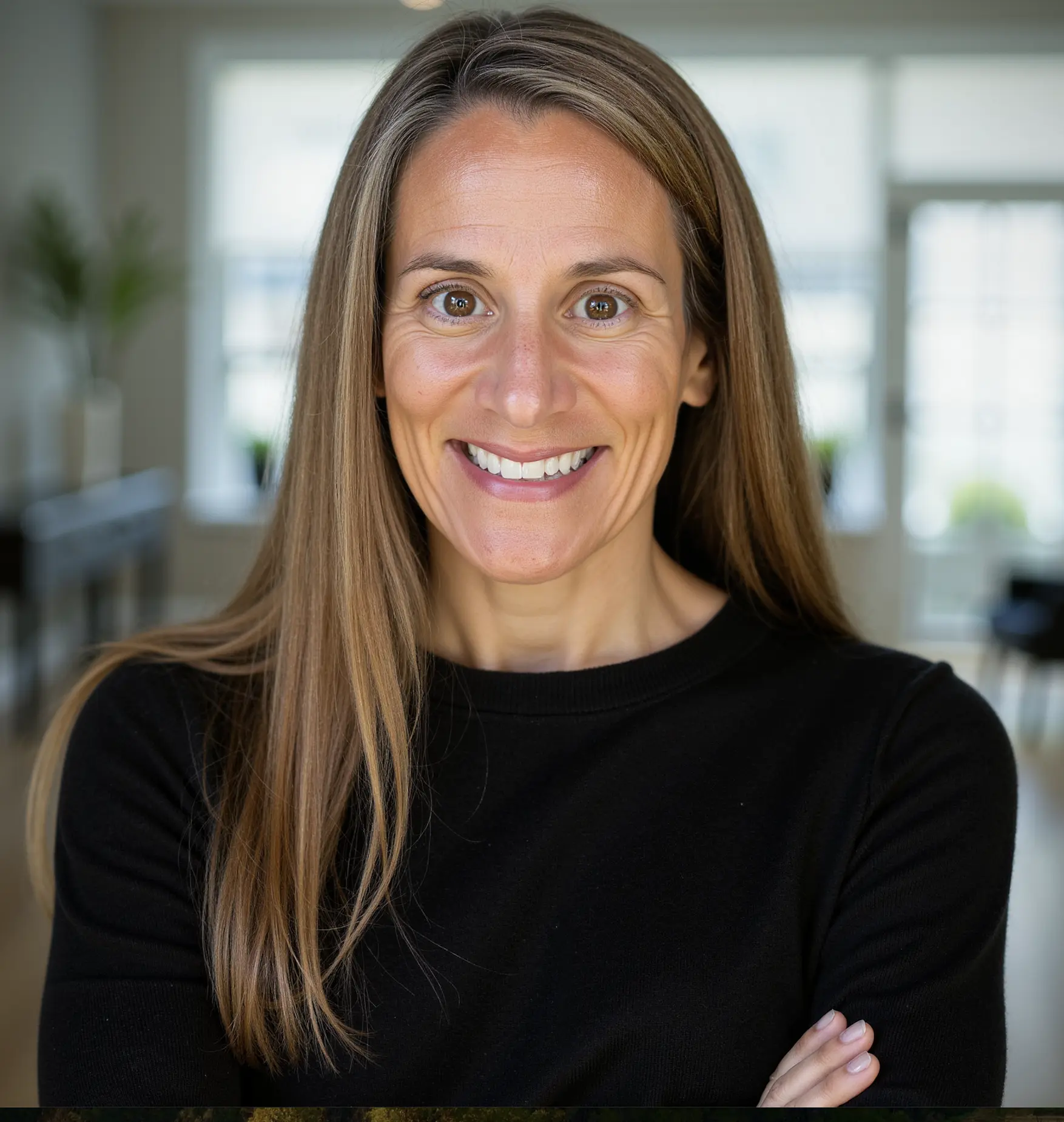
Dr. Nicole L'Etoile
CEO / Accessibility Consultant
Dr. Nicole L’Etoile, CPACC designs and delivers inclusive learning experiences that meet Web Content Accessibility Guidelines (WCAG) and Universal Design for Learning (UDL) principles. With a background in instructional design and accessibility, she trains educators and organizations to create content that works for all learners.,










